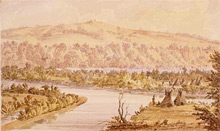Treaty with the Sioux, 1805
Signed September 23, 1805 at “Pike Island,” Minnesota
In 1805, Lewis and Clark were traveling through the western regions of North America. Regular reports on this expedition were sent to Spanish authorities by James Wilkinson -- first governor of the Louisiana Territory, a paid spy for Spain and an alleged conspirator with Aaron Burr in trying to establish an empire in the Southwest. In the summer of 1805, Wilkinson enlisted Zebulon Pike to mount an expedition up the Mississippi River, without informing the federal government.
In September, Pike met with a group of Dakota leaders at an island at the confluence of the Minnesota and Mississippi Rivers, a place of great cultural significance to Dakota people that is now called Pike Island. He recorded in his journal that two of the seven Dakota leaders had agreed to sell the site so that the U.S. could build a fort and promote trade, in exchange for an unspecified amount of money. (Pike valued the purchase at $200,000 in his journal.) Upon parting, Pike left $200 worth of gifts and allowed the traders that accompanied him to leave barrels of whiskey, leading some writers to characterize these gifts as the purchase price.
Years later, the U.S. Senate unilaterally added an amount of $2,000 to the treaty, which was never proclaimed by the President (a necessary step in making treaties official). Subsequently, the Dakota granted Pike Island to Pelagie Ainse, the mixed-blood daughter of a French fur trader and a Dakota woman; Pelagie became the mother of Alexander Faribault.
Fifteen years after the Pike meeting, the U.S. returned to build Fort Snelling on the site. As late as 1856, however, the title to the land was in question. In that year, the Military Affairs Committee of the Senate issued a report that stated:
"It does appear that General Pike made an arrangement in 1805 with two Sioux Indians for the purchase of the lands of that tribe, including the Faribault island, but there is no evidence that this agreement, to which there is not even a witness, and in which no consideration was named, was ever considered binding upon the Indians, or that they ever yielded up the possession of their lands under it.. [I]t was never promulgated, nor can it be now found upon the statute books, like any other treaty—if indeed a treaty it may be called—nor were its stipulations ever complied with on the part of the United States."





